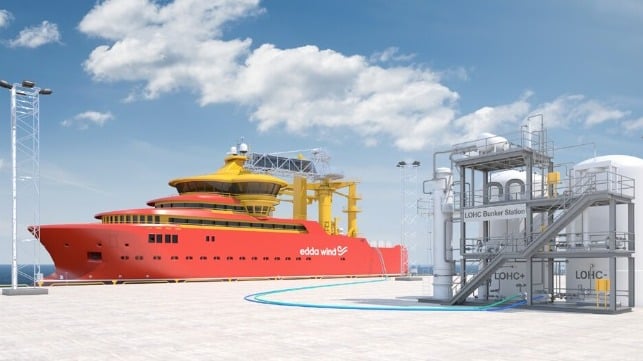Project to Demonstrate Hydrogen Carrier Powering Fuels Cells on CSOV

The Ship-aH2oy project, which consists of a consortium of 17 companies, seeks to develop and demonstrate a zero-emission propulsion technology that they believe could revolutionize the efforts to adopt hydrogen as a power source for shipping. The project calls for incorporating a liquid organic hydrogen carrier (LOHC) and hydrogen release unit into the ship. The European Union is awarding €15 million ($16.3 million) to the five-year effort to develop the technology and demonstrate it on a service operation vessel operated by Edda Wind.
There has been growing interest in the use of LOHC as it adds a new way of handling and using hydrogen that increases safety as the carrier oil is non-explosive and is held at ambient temperatures. Instead of using gaseous or liquid hydrogen, hydrogen is chemically bound to a carrier, which in this project is benzyl toluene, an industrially available thermal oil. Using this process, the hydrogen can be stored and transported within the existing fossil fuel infrastructure.
“The use of liquid organic hydrogen carrier technology in this project is a potential game-changer for the maritime industry’s accelerated transition to clean energy. The LOHC solution applied enables a superior safe and efficient way to store and transport hydrogen, proven in stationary systems,” said Øystein Skår, General Manager at Hydrogenious LOHC Maritime, a company based in Germany which is developing the carrier process. “We are thrilled to bring this innovative tech on the water and start testing it as the main power for the vessel, demonstrating its capabilities in this groundbreaking project.”
In the first phase of the project, they aim to introduce high-temperature solid oxide fuel cells (SOFC) and the LOCH technology to the test ship which will be one of the CSOVs built for Edda Wind. To demonstrate the technology, a 1 MW hydrogen power system, consisting of a fuel cell module and a hydrogen release unit, will be installed onboard the vessel.
The hydrogen release unit onboard the ship will extract the hydrogen from the LOHC to power the fuel cell. The waste heat from the SOFC will be recovered for the hydrogen release unit as well as the ship’s heating needs. In this way, they believe a high system efficiency can be achieved.
The project organizers also highlight that they intend to develop the design of a scalable system architecture for larger ships and power plants by integrating several megawatt LOHC/SOFC modules. They believe it will allow for easy replication of the system for other vessels. At a later stage, the project will also include a replication study for integrating the power system on board a passenger ship operating in coastal waters. The implementation and demonstration they believe will prove that the concept developed during the project is scalable beyond the 3 MW level.
“This project is a great example of the kind of innovation and collaboration that is needed to bring clean energy solutions to the maritime sector. We are excited to work with our partners to demonstrate the potential of combining high-temperature fuel cells and LOHC technology as a safe and scalable solution for zero-emission shipping,” said project coordinator Jaana Viitakangas, senior scientist at VTT.

that matters most
Get the latest maritime news delivered to your inbox daily.
The European Climate Infrastructure and Environment Executive Agency (CINEA) is funding the project which launched in January 2023 and runs through December 2027. It brings together a range of experienced partners spanning the maritime sector from research, technology, and design to shipbuilders, owners, and operators.
The partners in the Ship-aH2oy project include VTT Technical Research Centre of Finland, Edda Wind, Østensjø Rederi, Johannes Østensjø DY, Hydrogenious LOHC Maritime, Hydrogenious LOHC Technologies, Friedrich-Alexander-Universität Erlangen-Nürnberg, Siemens Energy, DNV Hellas, Engitec Services, Demokritos, Gondan Shipbuilders, Maritime CleanTech, Deltamarin, Teknotherm, ANEK Lines, and Ethnicon Metsovion Polytechnion.
